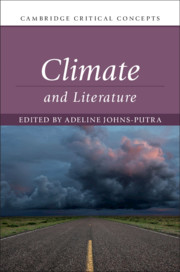Book contents
- Climate and Literature
- Cambridge Critical Concepts
- Climate and Literature
- Copyright page
- Contents
- Illustrations
- Contributors
- Acknowledgements
- Introduction
- Part I Origins
- Chapter 1 Literature, Climate, and Time: Between History and Story
- Chapter 2 Atmosphere as Setting, or, ‘Wuthering’ the Anthropocene
- Chapter 3 The Seasons
- Chapter 4 Climatic Agency in the Classical Age
- Chapter 5 Weathering the Storm: Adverse Climates in Medieval Literature
- Chapter 6 The Climate of Shakespeare: Four (or More) Forecasts
- Part II Evolution
- Part III Application
- Bibliography
- Index
Chapter 1 - Literature, Climate, and Time: Between History and Story
from Part I - Origins
Published online by Cambridge University Press: 31 July 2019
- Climate and Literature
- Cambridge Critical Concepts
- Climate and Literature
- Copyright page
- Contents
- Illustrations
- Contributors
- Acknowledgements
- Introduction
- Part I Origins
- Chapter 1 Literature, Climate, and Time: Between History and Story
- Chapter 2 Atmosphere as Setting, or, ‘Wuthering’ the Anthropocene
- Chapter 3 The Seasons
- Chapter 4 Climatic Agency in the Classical Age
- Chapter 5 Weathering the Storm: Adverse Climates in Medieval Literature
- Chapter 6 The Climate of Shakespeare: Four (or More) Forecasts
- Part II Evolution
- Part III Application
- Bibliography
- Index
Summary
Over the past decade, anthropogenic climate change has encouraged authors and readers to confront new modes of imagining time, selfhood, and narrative and to reassess the relationships among experiential, historical, and climatological time. In Western literary culture, historical and climatological time traditionally have seemed one and the same. Working within the 5000-year time frame of biblical history, writers envisioned a world that, since the sixth day of creation, always has been inhabited and therefore always had been shaped and reshaped by humans. In this worldview, ‘nature’ is always a product of anthropogenic intervention. Beginning around 1800, however, work in geology, planetary astronomy, and palaeontology transformed conceptions of climate by decoupling planetary history from human experience, memory, and myth. In giving narrative form to the collision of experiential and climatological time, Anthropocene fiction explores the problem that science fiction often seems more ‘realistic’ than traditional narrative realism.
Keywords
- Type
- Chapter
- Information
- Climate and Literature , pp. 15 - 30Publisher: Cambridge University PressPrint publication year: 2019
Accessibility information
- 3
- Cited by

